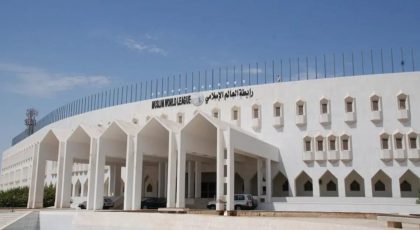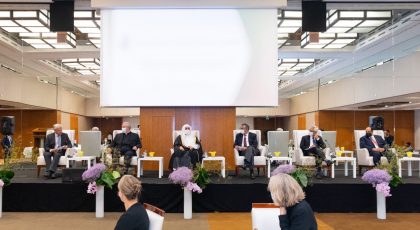
His Excellency the Secretary-General of the Muslim World League (MWL) and Chairman of the Association of Muslim Scholars, Sheikh Dr. Muhammad bin Abdulkarim Al-Issa, delivered an opening speech yesterday during the launch of the Forum for Promotion of Peace, held in the Great Hall of Expo 2020 Dubai, entitled: “Inclusive Citizenship from Shared Existence to Shared Conscience”, under the patronage of H.H Sheikh Abdullah bin Zayed Al Nahyan, Minister of Foreign Affairs and International Cooperation.
The forum emphasized the central role of the Makkah Al-Mukarramah Declaration (The Charter of Makkah) in the consolidation of the values and principles of comprehensive citizenship, as it included a relevant luminous context. This historical declaration received generous sponsorship of the Custodian of the Two Holy Mosques King Salman bin Abdulaziz Al Saud, may Allah protect him, and support of the Crown Prince, His Royal Highness Prince Muhammad bin Salman bin Abdulaziz, may Allah protect him, in the presence of the Mufti and scholars of the Islamic nation of all their sects, where more than 1,200 muftis and scholars and more than 4,500 Islamic thinkers signed in Makkah Al-Mukarramah next to Al-Kaaba, during the holy month of Ramadan, 1440 AH, 2019 AD.
-
Al Nahyan: Inclusive citizenship is an important expression of confidence and hope in the future of humanity

The forum was inaugurated by H.H Sheikh Nahyan bin Mubarak Al Nahyan, UAE’s Minister of Tolerance and Coexistence and continues until December 7th. At the beginning of his speech, His Excellency welcomed the MWL’s SG as a keynote speaker at the forum’s opening ceremony.
H.H Sheikh Nahyan said: “We’re meeting today to discuss the issue of comprehensive citizenship, which is an important expression of confidence and hope in the future of humanity and the attendees’ interest in promoting the values of acquaintance, dialogue, understanding and common goal, in addition to supporting channels of acquaintance and coexistence among all, which is an affirmation of your important role, but rather our role all in raising awareness of man and elevating their knowledge, perceptions, capabilities and behavior, as well as enabling them to perform their role and the basis for shaping the present and building the future.”
This was followed by the speech of His Excellency Sheikh Dr. Muhammad bin Abdulkarim Al-Issa, in which he noted that the issue of comprehensive citizenship, predicated on its common religious and cultural values and human values with their general natural law, its special and general constitutional texts and principles, its laws, charters and international norms, means within its “local” framework, coexistence on the national lands with entire rights, duties and equal opportunities in the full sense of fair equality.

His Excellency added: “In its “global” framework, comprehensive citizenship also means human partnership in “investment”, “management” and “protection” of our planet on which Allah Almighty made us successors and dwell it so that people can do justice, in the comprehensive connotation of the meaning of justice, and this can only be achieved in the true sense of the human family with its common values, laws and norms.
Dr. Al-Issa said: “The first meaning of comprehensive citizenship is taken care of and protected by the national state, and according to its efficiency, its giving and performance will be. As for the second meaning, it is carried out by all the forces of good with their sincere and effective will, starting with cooperation between nations and peoples within the framework of their interrelationships, or within the framework of their global international system with all its organizations and bodies framed by laws, charters, treaties, agreements and international norms. But when the talk is about citizenship, it is easy to move to a review of the values and principles referred to, with other relevant details. All of this is crystal clear, with which we do not need more elaboration and multiplication, but our need in our world is for a sincere and effective will that places its constant on the path of determination, and then proceeds with true work. Thus, we’re originally in dire need of paving the way by studying the challenges, obstacles and controversies of comprehensive citizenship, and then finding solutions with guarantees of its sustainability. This is the need of our world more than it needs to be reminded of those values, principles and other details. Yes, reminder is important, but the most important thing is to work with it, and more important than the abstract work is the ethics of application. A single text, for example, is used by the different tendencies and passions, and the truth is claimed by a multiplying group in our world, moved by political bets with open and clear goals, whose contexts are based on intellectual trends with extremist tendencies. They are, as I said, many around the world and for decades or actually for centuries, and in a number of those debates, they exceeded the logic of understanding and moral dialogue, and communication between nations, peoples and states, ignoring the search for the truth whose details may have been absent from them.”
-
Al-Issa: The Makkah Al-Mukarramah Declaration established the concept of comprehensive citizenship

He added: “This model which practices that inhumane employment, is not granted a sustainable success by Allah, and the near and far history is witness to that. These cases insist on seeking an integrated answer, and the answer lies in the true meaning of studying the issue of comprehensive citizenship in all its aspects, specifically highlighting the meaning of religious, cultural and constitutional peculiarity in general, which expresses the national conscience of each state, and explains the importance of that all, and its special identity, which must be appreciated, in respect of national sovereignty, with its religious and cultural peculiarity, which represents the prevailing national conscience, and only a heinous robbery would dare attempt to break into it. Therefore, in our wide world, we need the comprehensive citizenship dialogue because there is a dimension that is absent from much of its details and overlaps. Therefore, I say that comprehensive citizenship is a national goal and a global goal that requires understanding all its details, including taking into account its constitutional and legal differences according to the sovereign right with its positive logic in the legislation and culture of each state, with the need for all to respect international laws, principles, norms and common human values.”
-
Al-Issa: The ideas of the so-called political Islam escalated the civilizational clash between East and West… and bore a burden of Islamophobia.

Dr. Al-Issa added: “Based on the importance of understanding these details with their differences, we say and repeat that international differences must be taken into account in the specificity of their sovereign measures and religious and cultural convictions before generalizing theories and judgments.”
Dr. Al-Issa continued: “I may come to one of the comprehensive citizenship issues. Our world suffers from a return to racism in its abhorrent ignorance, and it is infiltrating, not into financially backward countries or so-called developing countries, but into countries that are classified as the first world countries. When you search for the reason for this civilizational backwardness that did not catch up with the astonishing material progress, you often find it in one thing, which is a missing link in education. Yes, it is education that devoted all study hours to the provision of science alone, and did not make time for interactive behavioral education, so the great scientist came out, not saturated with religious, national and human values, and we may say for the sake of everyone’s agreement, is not saturated with common human values. Therefore, the one who made weapons of mass destruction, and threatened with them human existence, this scientist learned science but did not learn values. We should not also miss the importance of the role of the family in consolidating the values we referred to, as it is the nucleus of society as the first and most important partner in shaping the minds of young people.

Meanwhile, Dr. Al-Issa warned that the Makkah Al-Mukarramah Declaration (The Charter of Makkah), graciously sponsored by the Custodian of the Two Holy Mosques King Salman bin Abdulaziz Al Saud, may Allah protect him, and supported by Crown Prince, His Royal Highness Prince Muhammad bin Salman bin Abdulaziz, may Allah protect him, and approved by the Islamic countries at their ministerial meeting held in Niamey, Niger, has devoted in its twenty-second article a luminous context on comprehensive citizenship, noting that it is an entitlement dictated by the principles of Islamic justice for the whole of national diversity, in which the constitution and the system expressing national conscience are respected, emphasizing the legitimate and complete empowerment of women as one of the pillars of comprehensive citizenship.
His Excellency added that the MWL launched an initiative from Europe to promote national values, and at the forefront of its goals is to spread awareness of the necessity of respecting the constitutions, laws and cultures of countries, whether among their citizens or those residing on their lands, within the horizon of a correct understanding of religious and national identity, based on the fact that they complement and do not contradict. This is in view of the purposes of religion that call for peace and harmony, and religion came only to call for the tranquility of societies and affect their harmonious national cohesion under any pretext. It also came only to order the fulfillment of covenants, harmony among hearts, and looking into the outcomes of matters with the insight of Sharia and the logic of reason with the legitimate claim in accordance with the rules and provisions of the constitution and the law, and peace and tranquility, for religious privacy. This is in addition to the warning against the danger of the ideas of the so-called political Islam, as they are outside the context of the purposes of Islamic Sharia, as these ideas reduced the great religion to a narrow political goal, and weaved for it a false robe of Islam, leading to the slander against Islam, hatred in its worst form, the escalation of civilized conflict and clash between East and West, and then incitement to violence and terrorism , and they are at the forefront of a number of reasons for Islamophobia.
His Excellency wrapped up his speech by congratulating the sisterly United Arab Emirates on its fiftieth National Day, wishing it, on behalf of the MWL, everlasting prosperity and development.
In his speech at the opening ceremony, His Excellency the President of the Forum for Promotion of Peace, Sheikh Abdullah Bin Bayyah, said: “Citizenship is not based on mere equality in rights and duties, nor through its purely legal concept. They will be stable only by establishing them on a solid foundation of values. With these values that education lays in souls, citizenship elevates to fraternity, and moves from common existence to shared conscience, so that citizenship becomes a melting pot in which all affiliations melt.”
-
Bin Bayyah: Thanks to the values that education establishes in souls, citizenship elevates to fraternity, and from common existence to shared conscience.

His Excellency Sheikh Bin Bayyah added: “Recognizing the impact of the new age in the concept of citizenship is inevitable, and denial of it inevitably leads to failure, and perhaps to strife. Achieving contemporary citizenship presupposes the ability to communicate with the times. It presents a host of concepts and values with titles represented in freedoms, and rights of women and children. It is also characterized by the intermingling of civilizations and intermarriage between cultures in a tireless movement and amazing developments.
In his speech, Sheikh Bin Bayyah praised the contents of the Makkah Al-Mukarramah Declaration (The Charter of Makkah) on the subject of comprehensive citizenship, as one of the scholars of this declaration who handed it over to the Custodian of the Two Holy Mosques, may Allah protect him, the patron of its historic conference and blessed assembly.
Sheikh Noor Al-Haq Qadri: Citizenship is perhaps the most important building block on the road to stability, security and development

His Excellency Sheikh Noor al-Haq Qadri, Minister of Religious Affairs of the Islamic Republic of Pakistan, also explained that the topic of the forum is important because citizenship is perhaps the most important building block on the road to stability, security and development, pointing to a number of ideas on comprehensive citizenship to achieve its important goal.
After that, the conference sessions began, which included several axes on its subject, and were attended by a number of Islamic and non-Islamic religious leaders along with a number of international thinkers.








